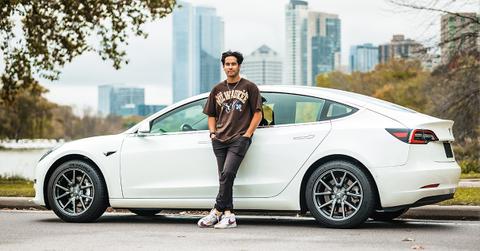 NEWS
NEWSSam Lister Discusses BLNK Slate Media's Approach To Remote Video Editing

Nov. 6 2022, Published 11:02 a.m. ET
At just 22 years old, you’d be forgiven for mistaking Sam for your average Gen-Z video creator, but he’s far more than that. He’s a video superstar, running a business that helps other video creators find success on their chosen platforms.
Here he explains more about the business and why it’s essential to create quality videos on social media. Sam Lister founded BLNK Slate Media, which recently had to pivot to a remote video editing model that has seen a major increase as lockdowns had people spending more time in front of their phones, tablets, and computers.
At just 18 years old, Sam launched BLNK Slate as a video production company recording raw events. In time, it eventually evolved into a company that turns raw footage into polished videos. Customers include podcasters, agencies, entrepreneurs, and social media stars
The idea is to create videos that capture and captivate attention. And of course, draw in investors, advertisers, and impressions to bring the video “star” acknowledgment and income.
Sam’s personal journey to creating BLNK Slate media started at a young age when he was interested in Instagram growth hacking before he started documenting his life.
“I was filming people with my iPhone, editing it on the phone, and it was just Ground Zero at the time,” he says.
This served as the inspiration to help others do the same through personal branding. Not wanting to sit behind a computer for 18 hours a day, he started outsourcing to other people and building an editing team, doing live interviews and live filming sessions.
Then came 2020, and the only way to move forward was to shift the focus to online only.
“That’s when we decided to do remote video editing and we just had to roll with the punches,” said Sam Lister.
BLNK Slate Media specializes in creating high-quality video people will want to watch, regardless of the platform the consumer is on. The goal, essentially, is to give people back their time so they can focus on getting their content right, while someone else takes care of the creative side of things.
“Editing is a super time-consuming process,” he says. “It can get really pricey, and it can get really complicated. So, we handle all of that to give creators their time back.”
According to a report by global market research company Fortune Business Insights, the video streaming market is expected to grow to $1,690.35 billion in 2029. This is at a compound annual growth rate (CAGR) of 19.9% and an increase on the 2022 value of $473.39 billion (which alone was up from $372.07 billion in 2021).
According to stats as of 2022 around 3.7 million videos are uploaded toYouTube every day – equating to around 30,000 hours of fresh content every hour, TikTok has over 1 billion users with over 55% of them uploading their own videos, and Instagram has approximately 95 million videos and photos uploaded a day.
With this video-first mindset comes some advantages to having quality videos. It’s more than just hitting record and telling a story, it’s also the editing, graphics, and a call to action. Things that the team at BLNK Slate Media specialize in with the goal to bring their customers more engagement, enhance brand awareness, and increase sales.
Want OK! each day? Sign up here!
Their focus is on honing and refining your message so that it translates to your goals.
Sam says the most important thing to remember when creating videos is that you need to remember why you’re doing it. Remember, you’re documenting your life, or part of it, and you’ll look back on those videos in five or ten years from now – so you want to make sure it’s a true reflection of you right now.
However, he also says that video isn’t necessarily a requirement.
“Don’t do a video if you don’t want to do a video," he says. “As counterintuitive as that may sound, some people don't communicate well on video. And that's completely fine.”
He says when he first started creating video content, he did so because he wasn’t a great writer, but he was good at speaking. He’d made audio podcasts, but also liked visual effects, so he joined those elements together.
“It was cringy, it was awkward, but I was enjoying the process,” he says. “Find a medium that works for you. Find how you communicate best and lean into that.”
And the third most important thing is to have fun with it and go at a pace that feels right for you so you don’t get into the space of creative burnout.
“It’s easy to get on the hamster wheel of creating, just to create something for your feed or algorithms. And if you’re having fun creating, the art will be so much better.
“We’re human. We can have fun. And that’s something that’s pretty easy to lose sight of these days.”

